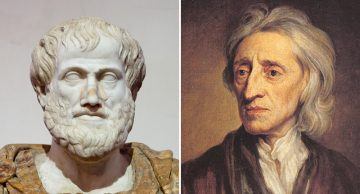Daily Kos in AlterNet:
 One of the most influential thinkers of all time, the ancient Greek philosopher Aristotle possessed a wide-ranging and insatiable curiosity. Most of his philosophy is what we would now call science: he wrote on biology, astronomy, zoology, physics, and psychology, to name just a few subjects. He also made important contributions to ethics and political theory. Unfortunately, the only works by Aristotle that have survived appear to be his lecture notes. The 17th-century English philosopher John Locke was a pioneering political thinker. He had a major influence on the U.S. Founding Fathers and provided the philosophical justification for the American Revolution.
One of the most influential thinkers of all time, the ancient Greek philosopher Aristotle possessed a wide-ranging and insatiable curiosity. Most of his philosophy is what we would now call science: he wrote on biology, astronomy, zoology, physics, and psychology, to name just a few subjects. He also made important contributions to ethics and political theory. Unfortunately, the only works by Aristotle that have survived appear to be his lecture notes. The 17th-century English philosopher John Locke was a pioneering political thinker. He had a major influence on the U.S. Founding Fathers and provided the philosophical justification for the American Revolution.
According to Aristotle, the goal of human life is eudaimonia. The Greek word eudaimonia is often translated as “happiness,” but a better translation might be “success”—not success at a particular activity but success at life. For Aristotle, eudaimonia means putting intellectual and moral excellence into action over a lifetime. For Aristotle, the success of a person’s friends, family, and fellow-citizens is part of the person’s success. I don’t just mean that a person needs help from others to be successful. We might say that Aristotle thinks of society as a team. Just as a person can win at baseball only by winning along with their baseball team, so a person can win at life only by winning along with their society. In fact, in the Nicomachean Ethics, Aristotle says that even after a person has died, the success or failure of their friends and family continues to affect how successful their life was (though Aristotle adds that this effect will not be enough to make a successful person unsuccessful).
More here.
